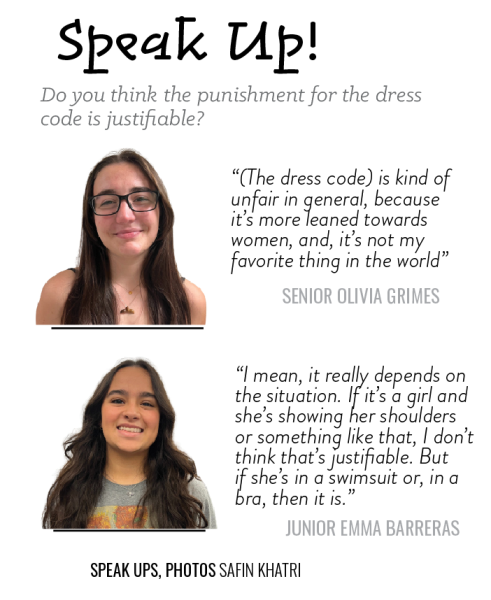Junior Ella Degeronimo said she has been dress coded five to seven times since her freshman year, and she also said it interrupts her life every single time.
“A lot of the time, it’s just teachers or administration telling me, ‘Oh, please wear a longer shirt, or do you have a hoodie or something to cover up?’ There’s been a couple times where I’ve been taken to the office and (the administration) called my mom, and they make me wear another shirt, which is extremely annoying and inconvenient,” Degeronimo said.
Not only did Degeronimo say her life was interrupted, but the rest of her school day was also impacted negatively due to the consequences of breaking the dress code.
“(Administration) gives you the ugliest shirts,” Degeronimo said. “And you have a bunch of people asking you about it, and you’re trying to focus in class but you have like ten people asking you about why you got dress coded, what you were wearing, and why you’re wearing a dumb looking shirt.”
Being dress coded, however, is one of the more mild punishments listed in the CHS student handbook. Detention, suspension, and expulsion are all viable options when it comes to punishing students for a variety of misbehaviors. Sophomore Helen Schvets said she went to detention once during her freshman year for skipping a class, and while it didn’t interrupt her school day, she did say that she didn’t think she deserved the detention.

“In my opinion, I skipped a class for a good reason, mainly because I had a breakdown,” Shvets said. “So I was crying and I was trying to calm myself down, and I didn’t want to straight up go into (my classroom) just bawling my eyes out.”
In addition to saying she didn’t think she deserved the detention, Shvets also said that she didn’t think the way punishments at CHS worked, and it didn’t do anything to deter her behavior.
Psychology teacher Mickey O’Toole said he agreed with Shvets in regards to in-school punishments being ineffective, especially when it comes to punishments for repeated offenses.
“My opinion of punishment is that it doesn’t really work,” O’Toole said. “Especially if you give a student a detention and they repeat the same thing. The point of a detention is to stop an undesirable behavior, but if it’s like, the thirtieth detention you’ve given them, it’s now just punitive and angry and mean.”
On the flip side, Maureen Borto, assistant principal in charge of student services, said that the effectiveness of the punishment greatly depends on a variety of factors, including the support system the involved student has at home.
“I don’t necessarily know if you can look at (the effectiveness of punishments) by consequence, it really depends on the student, the situation, and other things they need as well,” Borto said. “Depending on the consequence administered, there can also be support that goes with that.”
Even though Degeronimo said she doesn’t like the dress code implemented at CHS, she also said she understands why it’s in place.
“I understand that they want a professional environment; it is a school,” Degeronimo said. “But it’s not like I’m wearing a bra to school. It’s not like I’m coming into school naked.”
Degeronimo also said that the administration should try to see it from the student’s point of view.
“If it’s ninety eight degrees outside and I’m walking down the trail, I’m not gonna wear a hoodie,” Degeronimo said, “Or a giant tee shirt like I’m wearing now. I’m probably gonna wear a tank top and shorts.”
Shvets, as aforementioned, said she also thought administration lacked empathy for students when giving out punishments, since her detention was given to her right after she had a breakdown.
Degeronimo said she thought the administration should be focusing on enforcing things that matter, such as vaping in bathrooms and students showing up to class under the influence of drugs.

Borto said there are punishments that the school certainly takes more seriously than others.
“(The school takes seriously) anything that’s going to be illegal,” Borto said. “Drugs, alcohol, anything with weapons. I mean, weapons is obviously huge. If you look in the handbook, it outlines for you the grounds for first suspension, and then expulsion.”
However, O’Toole said that in some cases, giving a student a suspension for something such as skipping school doesn’t make sense.
All in all, O’Toole said that society should redefine what punishments are, and how giving them in school systems affects students. Instead, he said schools should invest heavily in positive coaching, as opposed to traditional punishments.
“We as a society and as a school should look at the purpose of punishments,” O’Toole said. “‘We have to (administer punishments), and (punishments were administered) to me, so I have to do it as well’ is not a good reason (to continue to administer punishments). Teaching is difficult, and I’m not trying to make it more difficult (by advocating for positive coaching), but if we’re looking for a long term behavioral change, it would be much more beneficial.”

